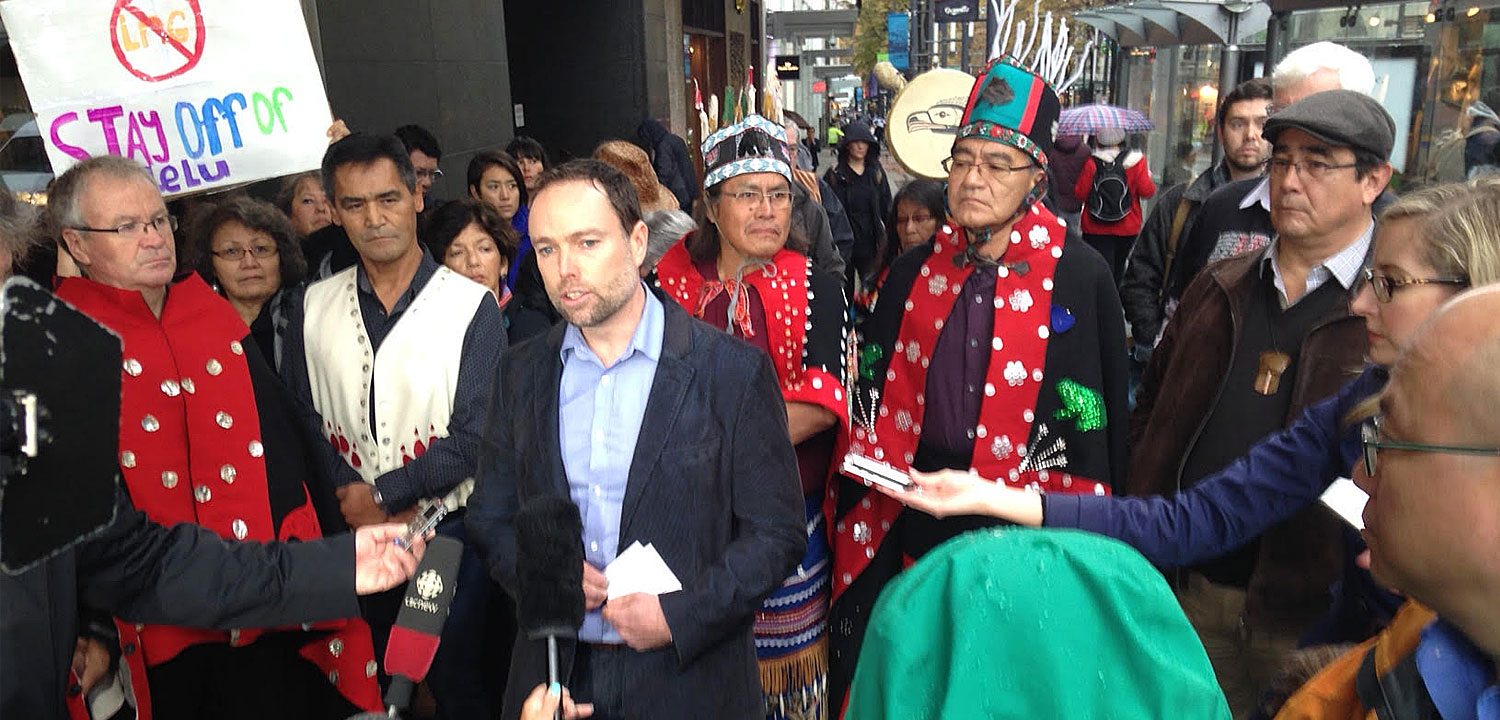Wild Salmon Center works with SkeenaWild Conservation Trust and other local advocates in BC on long-term conservation strategies for the region. Below is a press release on the latest development in the campaign to block the ill-conceived LNG project at the mouth of the Skeena River.
Canadian Courts Asked to Block Approval of Massive Petronas LNG project
First Nations and conservationists rally against “wrong project in the wrong place”
First Nations and environmentalists from northwest B.C. launched multiple federal court actions today aimed at stopping construction of a “dangerous and ill-conceived” $11.4-billion liquefied natural gas (LNG) project at the mouth of the Skeena River.
“Once again, we are forced to ask courts to do what our politicians seem unable to do – to honor Canada’s obligations to its Indigenous communities, and to protect our environment from catastrophic harm,” said Chief Yahaan (Donnie Wesley), of the Gitwilgyoots Tribe.
“Despite repeated requests, the federal government has failed to properly consult with our people,” said Chief Malii (Glen Williams), Chief Negotiator for the Gitanyow. “Justin Trudeau promised a new relationship with Indigenous communities. Instead, he added insult to injury by ignoring us, and giving the green light to a project that will destroy our way of life.”
In downtown Vancouver today, Wesley and Williams filed separate writs with the Federal Court, seeking a judicial review of last month’s approval by the Canadian government of the proposed Pacific Northwest LNG project. The project is majority owned by Malaysia’s state oil company, Petronas.
At the same time, they sent a letter warning Petronas, its investment partners, and the Malaysian public that the LNG project faces implacable opposition in Canada. “It doesn’t matter how much money you promise to spend in our territories – you cannot buy our assent to your project, and you will not achieve it”, the letter stated.
Petronas was alerted to today’s court actions, plans to rally international opposition, and ongoing civil disobedience to disrupt their plans to build a massive industrial facility overtop of Flora Bank, one of the most sensitive and productive salmon habitats in North America. The bank is used by hundreds of millions of juvenile salmon each spring and summer. Dating back four decades, federal fisheries scientists identified this area as a biological hotspot that should be protected.
SkeenaWild Conservation Trust filed its own judicial review of the project approval. It cites flaws in the Canadian Environmental Assessment Agency’s characterization of the project’s impacts. “The Agency gave the Environment Minister flawed information and conclusions about the project’s impacts on fish and fish habitat,” said Greg Knox, Executive Director of SkeenaWild. “We challenge the Agency’s conclusion that the project will have no significant impact on fish even though construction of the project could permanently destroy 35,000 square meters of crucial salmon habitat.”
SkeenaWild is also challenging the Agency’s failure to do a cumulative effects assessment of climate pollution from the facility. By the company and the government’s own admission, the project will become one of the largest sources of greenhouse gas emissions in Canada.
At a ceremony in Vancouver announcing the lawsuits, representatives of the Wet’suwet’en, Gitxsan, Lake Babine and Haida First Nations rallied in support of Gitwilgyoots, Gitanyow’s and SkeenaWild’s court actions.
As well, Grand Chief Stewart Phillip of the Union of B.C. Indian Chiefs, declared strong opposition to the project. “This is a dangerous and ill-conceived attack on our environment and our Indigenous rights,” Phillip said. “Our courts have ruled that Canadian energy companies cannot run roughshod over First Nations. Well, foreign companies can’t either.”
The lawsuits filed by First Nations on Thursday cite a recent Federal Court of Appeal decision, which overturned federal approval of a permit allowing Enbridge to build its Northern Gateway oil pipeline in the same region as the Petronas project. The court found that the company and the federal government failed to adequately consult with Indigenous communities along the pipeline route.
“As with Enbridge, and despite repeated requests that they consult with us, Petronas and the federal government failed in their duty to listen to the ancestral owners of Lelu Island,” Yahaan said. “We have never been opposed to development. But we have always opposed industrial development on top of the most important salmon habitat we have on our coast.”
Media Contact:
Oakley Brooks (503) 307-3927
Hero Image
